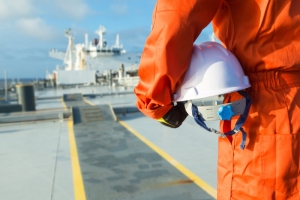


(Posted on 02/05/24)
Mental Health Support Solutions (MHSS) is deeply concerned as levels of loneliness and isolation experienced by Indian seafarers are becoming more apparent, particularly on vessels where cultural differences have not been adequately addressed.
Julia Oppermann, Clinical Psychologist at MHSS, has closely observed an increasing openness about feelings of loneliness and isolation among Indian seafarers. Ms. Oppermann said: "We have seen a significant increase in calls from Indian seafarers and office staff, particularly where cultural disparities have not been appropriately considered and there is an absence of a supportive environment that respects their cultural norms."
In addition to loneliness, the absence or limitation of communal dining experiences at sea can exacerbate feelings of disconnection and emotional distress among Indian seafarers. Julia Oppermann explained: "Eating together and sharing meals are deeply ingrained cultural practices in Indian society. When seafarers are unable to participate in these traditions, it can further contribute to their sense of isolation."
MHSS recognises that issues for Indian seafarers may have always presented a challenge, but it seems that they have become more noticeable in recent times. However, factors such as the unique conditions faced in the Red Sea may also be contributing to the exacerbation of these issues. It's difficult to determine whether these challenges are solely due to the geopolitical situation or if seafarers are simply being more open about their mental health struggles, or a combination.
Furthermore, the transition from seafaring life to family life can be challenging for Indian seafarers. MHSS CEO, Charles Watkins, stressed the importance of supporting seafarers during this transition, and said: "Ship managers can play a crucial role in supporting Indian seafarers by assigning contracts thoughtfully, considering their personal and familial circumstances. As India ranks as the fourth top country to supply seafarers, it is imperative for the maritime industry to address cultural differences and be aware of the unique challenges faced by Indian seafarers. By acknowledging and addressing these challenges, the industry can create a more supportive and inclusive environment onboard vessels."
MHSS believes that while it is likely the case that these issues have always existed for Indian seafarers, the fact that they are speaking about them more openly now and seeking support means that there is the opportunity to help many more mariners to overcome these difficulties and enjoy their lives at sea.
AtoB@C Shipping, a subsidiary of ESL Shipping, has announced the successful delivery of Fleximar, the... Read more
Western Bulk, together with reputable Norwegian partners A/S J. Ludwig Mowinckels Rederi, Premium Maritime... Read more
Pacific Basin Shipping Limited, one of the world’s leading dry bulk shipping companies, has announced... Read more
Columbia Group anticipates a period of strong expansion as an increasing number of international shipowners... Read more
Norse?Ship Management has expanded its use of Smart Ship Hub’s high frequency sensor data and... Read more
As the maritime industry gears up to welcome the IMO’s STCW bullying and harassment training amendments... Read more
NORDEN has acquired the cargo activities of Taylor Maritime in Southern Africa (previously operated... Read more
Philippos Ioulianou, Managing Director of EmissionLink, has warned the IMO’s decision to delay... Read more
VIKAND has highlighted the need for cultural change in the maritime sector as reports of bullying, harassment... Read more
The maritime industry is experiencing a period of significant transformation, driven by rapidly evolving... Read more